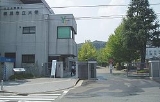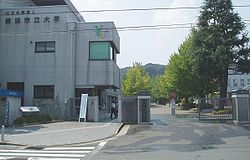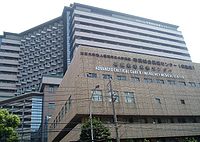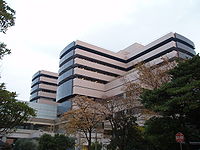
Yokohama City University
Encyclopedia

Japan
Japan is an island nation in East Asia. Located in the Pacific Ocean, it lies to the east of the Sea of Japan, China, North Korea, South Korea and Russia, stretching from the Sea of Okhotsk in the north to the East China Sea and Taiwan in the south...
. The main campus is located in Kanazawa-ku
Kanazawa-ku, Yokohama
is one of the 18 wards of the city of Yokohama in Kanagawa Prefecture, Japan. As of 2010, the ward had an estimated population of 209,565 and a density of 6,760 persons per km². The total area was 31.01 km². The ward symbol, established 1987, expresses the image of sea, waves, and a sea...
, Yokohama
Yokohama
is the capital city of Kanagawa Prefecture and the second largest city in Japan by population after Tokyo and most populous municipality of Japan. It lies on Tokyo Bay, south of Tokyo, in the Kantō region of the main island of Honshu...
.
History
An origin of YCU was founded in 1882 as . At first this school was maintained by the society of local merchants. In 1888 the school was renamed Yokohama Commercial School (橫濱商業學校, abbreviated to Y-School), a five-year school for boys (ages 14–19 or above). In 1917 Y-School was municipalized and in 1921 it became the only seven-year commercial school in Japan (for ages 12–19 or above). The Ministry of Education (MEXTMinistry of Education, Culture, Sports, Science and Technology (Japan)
The , also known as MEXT or Monkashō, is one of the ministries of the Japanese government.The Meiji government created the first Ministry of Education in 1871....
today) urged the school to shorten the curriculum by two years, for Japanese Commercial School Regulations (1921) did not specify a seven-year course for commercial schools. In 1924 Y-school became a five-year school attaching a two-year specialized course (a seven-year course de facto). In 1928 the specialized course of Y-School became Yokohama City College of Commerce (橫濱市立橫濱商業專門學校, abbreviated to Y-College). After being renamed Yokohama City Economics College, Y-College was reorganized into Yokohama City University in 1949, under Japan's new educational systems.
Another origin was founded in 1874 as . This hospital was municipalized in 1891. In 1940 the hospital intended to establish an attached medical school; and Japan's involvement in World War II
World War II
World War II, or the Second World War , was a global conflict lasting from 1939 to 1945, involving most of the world's nations—including all of the great powers—eventually forming two opposing military alliances: the Allies and the Axis...
(1941) promoted the intention. In 1944 Yokohama Municipal Medical College (橫濱市立醫學專門學校) was established, and Juzen Hospital became a college hospital. In 1947, after the war, the medical college became Yokohama Medical School (横浜医科大学), a municipal university, whose preparatory course (three years) was established in 1947 and the main course (four years) was established in 1949. In 1952 the medical school was merged with Yokohama City University.
In 1949, YCU had one faculty: the Faculty of Commerce. In 1952, two faculties were added (School of Medicine / Faculty of Literature and Science). The latter history of YCU is as follows:
- 1984 - Kihara Institute for Biological Research was established.
- 1995 - Faculty of Literature and Science was reorganized into two faculties: Faculty of International Liberal Arts and Faculty of Science.
- 2005 - Three faculties (Commerce, International Liberal Arts and Science) were merged into one faculty: International College of Arts and Sciences.
Faculties (Undergraduate Schools)


- International College of Arts and Sciences (in Kanazawa Hakkei Campus)
- Division of Liberal Arts and International Studies
- Division of Sciences
- Division of Economics and Business Administration
- School of Medicine (in Fukuura Campus)
- School of Medicine
- College of Nursing
Graduate Schools
- International Graduate School of Arts and Sciences (in Kanazawa Hakkei Campus)
- International Cultural Studies (Master's/Doctoral)
- Economics and Business Administration (Master's/Doctoral)
- Natural/Basic and Applied Sciences (Master's course only)
- Environmental Biosciences (Master's course only)
- Nanoscience and Technology (Doctoral course only)
- Bioscience and Technology (Doctoral course only)
- Supramolecular Biology (in Tsurumi Campus - Master's/Doctoral)
- Graduate School of Medicine (in Fukuura Campus - Master's/Doctoral)
Research Institutes
- Kihara Institute for Biological Research (in Maioka Campus)
- Academic Resource and Information Center
Notable alumni
- Ken HiraiKen Hiraiis a Japanese R&B and pop singer. Since his debut, Hirai has worked as a model, actor, composer, lyricist, singer, and spokesperson.During his career, Hirai has released 32 singles and 11 albums up until October 2010. According to Oricon, his single Hitomi Wo Tojite became the best-selling single...
, singer - Hase SeishuHase Seishuis a well-known Japanese novelist. He is known for writing Yakuza crime novels.A few of his novels were turned into movies.Seishu also wrote the story for Sega's 2006 video game, Yakuza, and its sequel, Yakuza 2....
, a novelist - Yoshiharu SekinoYoshiharu Sekinois a Japanese explorer, travel writer and photographer, anthropologist, and doctor.Sekino was born in Tokyo. In 1971, while still a student at Hitotsubashi University , he cofounded and participated in a university team that descended the entire length of the Amazon, thereafter travelling around...
, explorer

